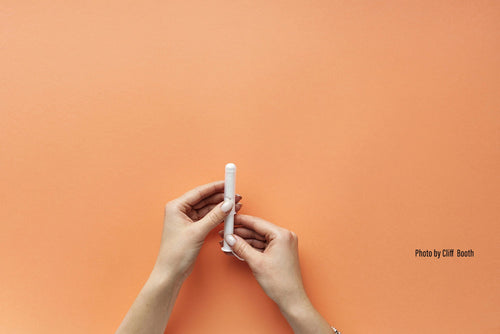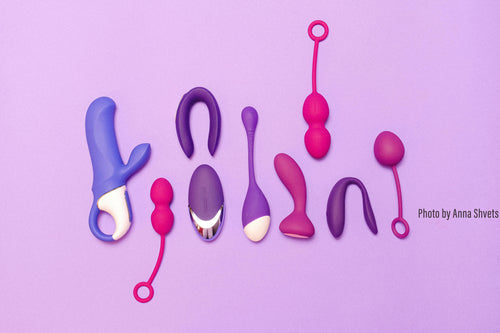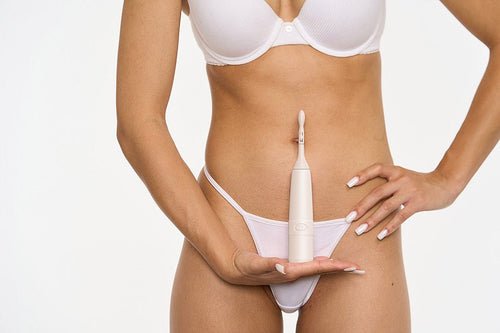Menopause and Sexual Wellness: Navigating Pleasure Through the Change
Menopause and Sexual Wellness: Navigating Pleasure Through the Change
Menopause is a natural transition, but let’s be honest — it can feel anything but smooth. Between hot flashes, mood swings, and sleep disruptions, it’s no surprise that many women also experience changes in their sexual wellness. But here’s the truth no one talks about enough: menopause doesn’t have to mean the end of sexual pleasure. In fact, it can be the beginning of a new, more empowered chapter.
Understanding how menopause affects your body — and how to adapt your approach to intimacy — can help you stay connected to your sexuality, your partner, and yourself.
How Menopause Affects Sexual Health
As estrogen levels decline, so do several key aspects of sexual function. Common symptoms include:
-
Vaginal dryness
-
Decreased libido
-
Thinning vaginal tissue (vaginal atrophy)
-
Pain or discomfort during intercourse
-
Lower arousal response or difficulty reaching orgasm
These changes are physical — but they often carry emotional weight, affecting confidence, intimacy, and overall quality of life. Fortunately, there are real, effective ways to address them.
Adapting to a New Normal — Without Giving Up Pleasure
Menopause doesn’t mean your sex life is over. It means your body is changing, and it deserves more care and attention — not less.
Here are ways to keep your sexual pleasure alive and thriving during and after menopause:
1. Lubrication Is Essential
One of the most immediate and effective ways to reduce discomfort is using a high-quality lubricant. Water-based lubricants are often ideal, especially for use with sex toys or during intimacy, as they reduce friction and dryness without irritating sensitive tissue.
2. Explore Vibrators and Sex Toys That Support Arousal
Many women report a reduction in sensation or longer time to reach orgasm during menopause. A powerful, well-designed vibrator — like the Celebrator, for example — can help stimulate blood flow, awaken nerve endings, and reignite the pathways to orgasm.
3. Take Your Time
Hormonal shifts mean your body may need more warm-up time. Don’t rush. Slow, intentional touch, extended foreplay, and mental arousal all become even more important. This is a great time to focus on quality over quantity — deeper connection over routine.
4. Consider Pelvic Floor Exercises
Menopause can weaken pelvic floor muscles, which play a role in both bladder control and orgasm. Practicing Kegels or using pelvic floor training tools can help maintain tone, increase sensation, and support sexual function.
The Emotional Side of Menopausal Intimacy
Many women also experience body image issues, fatigue, or anxiety that affect how they feel about sex — especially in long-term relationships. That’s perfectly normal. The key is communication.
Talk openly with your partner about what feels good, what’s changed, and what you need. Honesty and vulnerability can create intimacy that goes beyond physical connection and make sex more fulfilling than ever.
Bottom Line
Menopause changes your body — but it doesn’t have to take away your pleasure. With the right tools, mindset, and support, you can continue to enjoy intimacy, explore new forms of arousal, and stay connected to your sexual identity.
The key is not to fight the change — but to evolve with it. Your pleasure doesn’t end here. In fact, it may just be beginning.
Related Posts
-

Nutrition and Sexual Wellness: What You Eat Matters More Than You Think
Nutrition and Sexual Wellness: What You Eat Matters More Than You Think When people think about sexual wellness, they...
-

Intimacy for the Modern Woman: Balancing Wellness, Pleasure, and Self-Care
Intimacy for the Modern Woman: Balancing Wellness, Pleasure, and Self-Care In today’s world, women juggle careers, re...
-

I Heard My Ex Wants to Start Dating Again… Should I?
I Heard My Ex Wants to Start Dating Again… Should I? You’ve just heard that your ex is planning to start dating again...
-

How to repair a relationship after cheating?
How to Repair a Relationship After Cheating: Rebuilding Trust and Intimacy Few things shake a relationship to its cor...
-

My Spouse Wants to Try the Swinging Lifestyle — What Now?
My Spouse Wants to Try the Swinging Lifestyle — What Now? Hearing your partner say they’re interested in the swinging...
-

Lubricants 101: Water-Based vs. Silicone-Based and What to Use with Your Sex Toys
Lubricants 101: Water-Based vs. Silicone-Based and What to Use with Your Sex Toys When it comes to enhancing sexual p...
-

The difference between IPX ratings and how to care/cleaning your toy
Understanding IPX Ratings: What They Mean for Your Sex Toy and How to Clean It Safely When it comes to choosing the r...
-

Yoga and sexual health
Yoga and Sexual Health: The Mind-Body Connection to Better Pleasure Yoga is often celebrated for its ability to relie...
-

Personal shaving - is shaving pubic hair the right move? Is it healthy or not?
Personal Shaving: Is Shaving Pubic Hair the Right Move for You? Pubic hair grooming is a personal choice, influenced ...
-

The Power of Vibrations: How Different Vibrations Affect Your Sexual Pleasure
The Power of Vibrations: How Different Vibrations Affect Your Sexual Pleasure When it comes to sex toys, vibration is...
-

How to Choose Sustainable and Eco-Friendly Sex Toys
How to Choose Sustainable and Eco-Friendly Sex Toys As environmental awareness grows, many people are rethinking the...
-

The Link Between Sexual Health and Mental Well-being
The Link Between Sexual Health and Mental Well-being When people think about managing stress and anxiety, practices l...
-

How to Build Confidence Through Sexual Wellness
How to Build Confidence Through Sexual Wellness Confidence isn’t just about how we present ourselves to the world—it...
-

How to Use Sex Toys to Enhance Your Solo Play Experience
How to Use Sex Toys to Enhance Masturbation Solo play is a powerful form of self-discovery, relaxation, and empowerme...
-

How to Use Sex Toys to Enhance Your Solo Play Experience
How to Use Sex Toys to Enhance Your Solo Play Experience Solo play—also known as masturbation—is one of the most nat...
-

The Role of Lubrication in Enhancing Your Sex Toy Experience
The Role of Lubrication in Enhancing Your Sex Toy Experience When it comes to using sex toys, there's one simple ad...
-

Sexual Wellness for People with Disabilities: Exploring Accessible Toys
Sexual Wellness for People with Disabilities: Exploring Accessible Toys Sexuality is a core part of being human—and t...
-

How to Talk to Your Partner About Introducing Sex Toys into Your Relationship
Bringing up sex toys with your partner might feel awkward at first, but with the right approach, it can open the door...
-

How Hormones Affect Your Sexual Desire—And How Sex Toys Can Help
Hormones play a major role in our sexual desire, influencing everything from arousal to sensitivity. Throughout life,...
-

Postpartum Pleasure: Overcoming Orgasm Challenges After Childbirth
Bringing a baby into the world is a life-changing experience, but many women find that their bodies—and their pleasur...
-

Mindful Masturbation: How to Incorporate Mindfulness with Sex Toys
In a world filled with distractions, many people rush through self-pleasure without truly being present in the moment...
-

Sexual Wellness for Men: Exploring Products Beyond the Basics
Here’s a blog draft for your topic: Sexual Wellness for Men: Exploring Products Beyond the Basics When it comes to s...
-

Sex Toys for Couples: How to Improve Communication and Intimacy
Here’s a blog draft for you: Introducing sex toys into a relationship can be an exciting way to enhance intimacy, st...
-

Exploring Your Pleasure Zones: A Beginner’s Guide to Self-Exploration * Understanding Your Body and Enhancing Self-Pleasure
Self-exploration is a natural and empowering part of understanding your body, desires, and sexual wellness. Yet, for ...
-

Top 5 Myths About Sex Toys—And the Truth Behind Them
Sex toys have been around for centuries, yet they still carry a lot of stigma and misinformation. Whether due to cult...
-

Are Tampons Safe? Understanding the Hidden Risks of Tampon Use
For decades, tampons have been a go-to menstrual product for millions of women worldwide. Convenient, discreet, and e...
-

How to Safely Clean and Care for Your Sex Toys: A Guide for All Genders
Sex toys can be a fantastic way to enhance pleasure and explore your body, but keeping them clean and well-maintained...
-

A Comprehensive Guide to Men’s Sex Toys: Finding the Best Fit for You
Sexual wellness and self-exploration are vital aspects of a healthy lifestyle, yet they’re often under-discussed when...
-

Understanding the Different Types of Sex Toy Vibrators: Which One Is Right for You?
Vibrators have become a staple in the world of sexual wellness, offering a wide range of benefits that cater to diver...
-

Breaking the Stigma: Why Sex Toys Aren’t Just for Masturbation
When you hear the term “sex toys,” your mind might immediately jump to solo play. For a long time, society has framed...
-

The Benefits of Regular Sexual Wellness Practices
Sexual wellness is an essential yet often overlooked aspect of overall health. Just like regular exercise, a nutritio...
-

How to Choose the Right Sex Toy for Your Body Type
Finding the right sex toy can be a game changer when it comes to your own personal pleasure. But with the plethora of...
-

Lack of Orgasm Can Affect Physical Health
We often hear about the emotional, mental, and even relationship benefits of orgasm, but can the lack of orgasm actua...
-

How to Bring Up the Topic of Masturbation and Sex Toys with Friends
How to Talk About Masturbation & Sex Toys with Friends Let’s be real — talking about masturbation and sex toys wi...
-

The Impact of Anorgasmia on Relationships: Stress, Self-Esteem, and Inadequacy
Anorgasmia, the persistent inability to reach orgasm despite adequate sexual stimulation, is a condition that can...
-

How Do I Know If I Have Anorgasmia?
Anorgasmia is a medical condition characterized by the inability to achieve orgasm, even with adequate sexual stimu...
-

Why Can’t I Orgasm?
Anorgasmia...causes, symptoms, what is it? If you haven’t heard the word “Anorgasmia” until now, it’s one you shou...
-

Intimacy Building: How Couples Can Enjoy Celebrator Together
Intimacy lies at the heart of a strong relationship, and finding new ways to connect with your partner can breathe fr...
-

Demystifying the Science of Orgasm: How Celebrator Enhances Pleasure
The Science Behind Orgasm and Celebrator's Enhancement of PleasureOrgasm, the epitome of pleasure and release, is a f...
-

The Art of Self-Care: Incorporating Celebrator into Your Routine
The Art of Self-Care: Nurturing Your Sexual WellnessIn the realm of wellness, the term 'sexual wellness' is a rising ...
-

Exploring Sexual Wellness: The Power of Owning Your Orgasm
Sexual wellness is a multifaceted topic that goes far beyond the basics of contraception and protection against STIs....









































